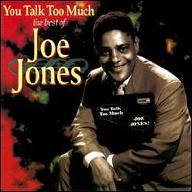Joe Jones
from New Orleans, LA
August 12, 1926 - November 27, 2005 (age 79)
Biography
Best remembered for the 1960 novelty smash You Talk Too Much, New Orleans RB singer Joe Jones later forged a career in production and publishing before becoming a galvanizing force in the battle for artists' rights. Born in the Crescent City on August 12, 1926, Jones followed a World War II naval stint by studying at the Juilliard Conservatory of Music. Upon returning to New Orleans he served as a valet for blues great B.B. King, later graduating to the positions of pianist and arranger. Jones also toured behind Shirley Lee before forming his own band despite limited vocal ability. After playing the French Quarter nightclub circuit for several years, he cut his single Will Call for Capitol in 1954. After briefly resurfacing on the Herald label in 1957, the following year Jones signed with New York City-based Roulette to cut You Talk Too Much, a song written by Fats Domino's brother-in-law Reggie Hall and summarily rejected by the Fat Man himself. Roulette shelved the disc, but Jones loved the song and re-recorded it in 1960 for the small New Orleans label Ric, complete with a new arrangement courtesy of Harold Battiste. When You Talk Too Much topped New York radio, Roulette cried foul, filing an injunction that forced Ric to withdraw its version. The song soon reappeared on Roulette, crossing over to reach the pop Top Five by September. While Ric issued an answer record, Martha Nelson's I Don't Talk Too Much, Jones' own follow-up, One Big Mouth, flopped, and outside of 1961's minor hit California Sun, he never charted again. Moreover, he earned next to nothing from the success of You Talk Too Much and in disgust relocated to New York to pursue a career in production, shepherding the fledgling careers of the Dixie Cups (of Chapel of Love fame) and RB singer Alvin Robinson. Jones migrated to Los Angeles in 1973 and founded his own publishing firm. He also became an advocate for the rights of fellow RB acts, helping African-American performers regain the rights and royalties they'd signed away during the infancy of the modern recording industry. Jones died in L.A. on November 27, 2005, following quadruple bypass surgery. He was 79. ~ Jason Ankeny, Rovi
Top Tracks
Albums
Videos
Close














